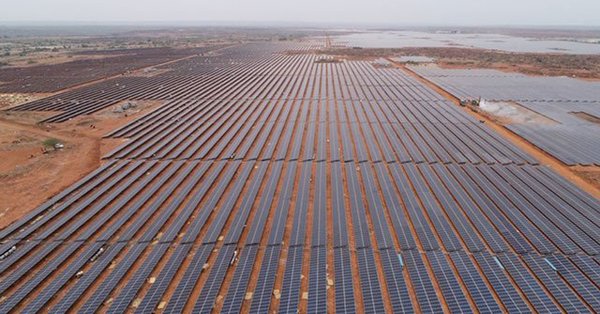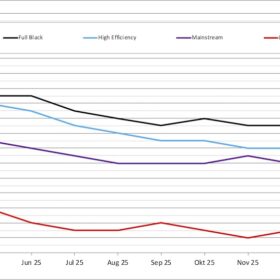The 1070 MW solar auction for Rajasthan yielded an all-time low tariff of INR 2.0/kWh, breaking the previous record of INR 2.36/kWh. The auction witnessed international organizations’ participation, displaying their confidence in the Indian renewable energy industry even during pandemic times.
National Solar Energy Federation of India (NSEFI), the umbrella organization for solar energy stakeholders in India, welcomes the all-time low tariff of INR 2.0/kWh.
“This auction and the tariff discovered will script a new history in our solar energy Journey. NSEFI was founded with the objective of cost reduction and making solar energy affordable for all, and we are delighted that the dream has come true,” NSEFI Chairman Pranav Mehta remarked.
Significantly, the minimum solar tariffs discovered in India fell by 131.5% over the last five years, with an 18% drop achieved in the last five months alone.
Rajasthan continues to be a top destination and preferred choice for Indian renewable energy developers. Factors ranging from higher irradiance, land availability, evacuation infrastructure have always favored developers to bid for lower tariffs in Rajasthan.
Since the basic customs duty (BCD) and the Approved List of Models and Manufacturers (ALMM) regime has not officially begun and the market anticipates a steady fall in the module prices, the quoted tariff of INR 2/kWh in Rajasthan PV auction doesn’t come as a surprise especially when developers have freedom in opting for tracking and use of high-efficiency modules. Additionally, the much-contested Rajasthan Renewable Energy Development Fund (RREDF) contribution of INR 2 lakh/MW has also been waived off for this tender.
Access to cheap capital has always been a critical factor in the renewable industry. The last few auctions have seen increasing participation of foreign investors with access to affordable capital, which has led to a steady fall in the tariffs quoted. This is a testament to India’s growing reputation as the most favored destination for renewable energy investments.
Apart from market forces working in favour, the auction was held at a time when the government, amidst the Covid pandemic, has reemphasized its commitment to Green energy by introducing a plethora of policy measures, triggering a positive response from the developer community.
DISCOM bailout under Aatmanirbhar Bharat (Self-reliant India) Scheme, condensed performance bank guarantee (PBG) and earnest money deposit (EMD) requirements, and Government’s intent to address accountability in curtailment and expedite Change-in-Law claims through a streamlined mechanism have played an instrumental role in re-instating confidence among investors in the recent bids.
Overall, in a year when every business vertical has been adversely affected, the Indian solar industry had a surprisingly positive year with four big auctions, all of them equally record (and ground) breaking. This gives a much-needed push to the industry as it enters the year 2021 with only 24 months to achieve an ambitious target.
The views and opinions expressed in this article are the author’s own, and do not necessarily reflect those held by pv magazine.
This content is protected by copyright and may not be reused. If you want to cooperate with us and would like to reuse some of our content, please contact: editors@pv-magazine.com.








India has 3.7Mkm2 of Land and 2.2Mkm2 of Agricultural Land and an ever-increasing Population of 1.3 Billion.
About 300,000km2 of Non-Agricultural land is used for Rural Housing (~200Million units) , Panchayat and other Rural Services… Schools, Health Centets, Ration Shops, Grazing, Playgrounds etc.. and another 250,000km2 for Urban/City/Metros..
This leaves barely One Million km2 for the Himalayas (1,200km long) parts of Deccan, Forests and other uninhabitable/marsh land, Desert(s), Lakes.. Resevoirs, Streams and Rivers.
In other words… India CANNOT AFFORD TO DIVERT LAND FOR ANY OTHER PURPOSE WITHOUT REDUCING THE ABOVE “UN-USED LAND”… THAT CAN BE USED FOR FEEDING ITS PEOPLE…. IN THE FUTURE…
Most significant are the Deserts and the Rocky/Dry land…. called “Un-used” …. All that they lack is Water to make them “fertile” (India gets ~ 1m of Rain Annually… a whopping 3.7 Trillion m3/yr….) and MUST be kept available for feeding its people in the future.
Unfortunately…. the mushrooming Solar Farms (with Ground mounted PV Structures) either use Fertile Agricultural land or the above Deserts/Unused Land…. the latter “given away/gifted” to Solar Farms in a massive “Land Grab”… by Govt bodies, as these short sighted, myopic, even corrupt Offocials, compromise the future growth of Agricultural Land to feed it additional millions added every year to its “food basket”….
Fortunately…. the AgriVoltaics (AV) Technogy Option exists that permits Solar Power Genetation AND Agriculture on the SAME LAND AND AT THE SAME LAND….. SIMULTANEOUSLY….. only India has to open its eyes and not 🙈🙉🙊🙈🙉🙊 as it mortgages the future of Agriculture….. to “private Solar Farms”…. that grow NO FOOD….